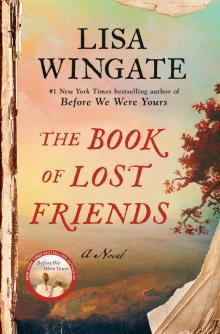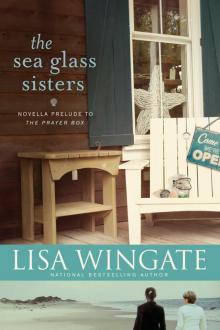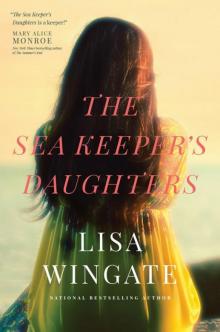- Home
- Lisa Wingate
Dandelion Summer Page 13
Dandelion Summer Read online
Page 13
The girl frowned into the mirror, her bottom lip pouching on one side. “You think I look like Jackie Kennedy, J. Norm? You think I’m ever gonna be pretty, like she was?” Her face narrowed, as if she were trying to imagine the answer for herself.
I think it’s more important for a girl to be smart. The words were on the tip of my tongue, but it’s a foolish man who willingly tastes the dish of regret once he knows how bitter it is.
“I mean,” she went on, her gaze sliding over and catching mine, her odd silver-green eyes bright in this light, “I was just wonderin’. Not in some kind of weird way, ’cause I’m young and you’re old and stuff, but if you were young, would you think I was, like, pretty?”
For reasons I could not grasp, the words that had never come to my lips for Deborah came now for this child. “I think you are beautiful. A beautiful young lady. Like Jackie Kennedy.”
She smiled, bashful for the first time since I’d known her. Looking down at her hands, she slipped off a glove. “No prince from Camelot’s gonna be sweeping me off to Kitty-bunkport, though, probably.”
I felt obliged to make a point. “Well, certainly that boy, that Dron, is no prince, now, is he? Not the sort a princess should be going around with.”
Her gaze slid toward me again. “De-Ron,” she corrected.
“Precisely. That sort of boy isn’t worth the trouble.”
She drew back, offended. “You don’t know DeRon. He scored more points in basketball than any high school player in Dallas last year. He’s set to get a college scholarship. Every girl in school wants to be DeRon’s girlfriend.”
I suddenly wondered how I’d allowed myself to be drawn into such a ludicrous conversation. I knew nothing of high school romance. “In my day, there were standards. A young man was expected to behave in a proper way. A young woman who thought anything of herself insisted on it.”
“Whatever.” She reached for the hat, wincing when her lacerated skin touched the fabric of the overshirt. “Well, that’s not how it is anymore. You go acting like you’re some kind of princess, you can sit home by yourself on Saturday night.”
“Would that be the worst thing?”
Her thumb caressed the feathers on the hatband, as if she felt the need to admire it a moment longer. “It would be in my house. I hate it there.” The words ended in a sigh. “DeRon’s just . . . I just want someone to . . . want me around, you know?” Her chin trembled and she swallowed hard, then fluttered a glance my way, as if she were waiting for an answer. What was I to say? I could guide a rocket to the moon or design systems to track missile launches halfway across the world, but I knew nothing of advising a teenage girl, of offering comfort or pertinent information. Yet, there she was, her eyes soft and round, the color of spring leaves, expectant.
I remembered something an elder colleague once told me when I was considering a position overseas. The job included a long-term contract requiring me to be absent for extended periods in the lives of our young children. I repeated the advice now, because it seemed to apply. “We all make trade-offs to get what we want. But no matter what you stand to gain, when the thing you’re asked to trade is yourself, the price is too high.” What shall it profit a man if he shall gain the whole world and lose his own soul? My father, with whom I’d engaged in perhaps only one or two lengthy conversations in my life, was a successful oilman who often quoted the wisdom of Proverbs.
Placing Annalee’s hat and gloves into the box, the girl gave the contents a narrow look. “You don’t live where I live.”
“Admittedly, Epiphany, I don’t. But some principles are universal to the human condition. ‘What shall it profit a man if he shall gain the whole world and lose his own soul?’” I shifted the cover onto the box, thinking about the hat and gloves. Annalee had so many pieces of clothing, so many accessories. She probably wouldn’t even have remembered where these were purchased.
“That’s from the Bible. Who told you my name is Epiphany, anyway? It’s Epie. That’s what people call me now.”
“Why?” I turned to put the box back on the shelf, then stood holding it instead.
“Because I like it. Because Epiphany’s a stupid name.”
“It’s a charming name.”
“Yeah, like somebody in charm school.” She pushed her hands onto her hips and smirked at me. “It doesn’t fit, you know?”
“I think it fits nicely. It’s the sort of name that sets expectation.”
She blew out a puff of air, her eyes casting toward the ceiling in the way of an exasperated teenager.
“Do you even know where it hails from?” I asked. “The origin of your name . . . Epiphany?”
A shadow crossed her face. Apparently I’d hit upon a dark subject. “My mama picked it out of a hat, I guess. It don’t . . . doesn’t mean anything.”
I continued, despite her look of disinterest. I’d worked in Greece and Italy both, at different times. The name wasn’t so uncommon there. “It’s from the Greek epiphaneia, meaning ‘appearance’ or ‘manifestation.’ It hails back to the feast of the Epiphany in January, which celebrates the revelation of God in human form. It was an important holy day in early Christian traditions. A special day. It’s a name to be proud of.”
Tilting her head to one side, Epiphany considered her reflection in the mirror, as if she were seeing something new. “Huh,” she murmured. “It means all that? My mama probably hasn’t got a clue.”
I stood behind her, watching her watch herself. “The point is that now you know.”
“Guess I do.” She considered her reflection a moment longer, then turned away, clapping her hands together in front of herself. “Suppose we oughta go on upstairs and get to work, huh?”
“I suppose we should.” I held the box out to her. “You take these home with you. You keep them.”
She blinked, her expression filling with such pleasure that I was tempted to allow her to keep anything she wanted from the closet. I should have, but I couldn’t bring myself to disturb the way Annalee had left things.
“You mean the whole box?”
“Yes. You think about Jackie Kennedy the next time DeRon comes around. You’re as worthy of Camelot as anyone, Epiphany.”
The conversation ended there. Epiphany set the box outside the bedroom door, and we proceeded upstairs to work. The attic was hot today, and before long, a gloss of perspiration coated Epiphany’s skin as she lugged storage containers up and down the stairs.
“Man,” she panted during one of her trips to the office. “It gets any hotter up there and I’m gonna need one of the pills you got in your pocket.” Swiping a wrist across her forehead, she craned toward my desk, where I was sorting through yet another tub. This one appeared to be filled with old quilts. So far, I’d found nothing of use in a potpourri of containers—just aging holiday decorations, packages upon packages of plastic eggs from some long-forgotten egg hunt, old toys and stuffed animals, yellowed baby clothes.
My hand settled on a Matchbox car, a green metal station wagon with a pull-behind Airstream trailer. A memory whisked across my consciousness, the stroke of a broom stirring up dust that had settled long ago. I was driving along a quiet, winding road near Yellowstone, the tall shadows of the pines falling lazily over the car, sunlight passing in patches. I looked in the rearview mirror. Roy lay curled in the large window ledge above the backseat, his legs knobby and brown, feet small and bare, crusts of dirt between his toes. He drove the miniature car and camper along the top of the seat, annoying his sister. Deborah was busy with a coloring book.
Annalee had purchased the toys for them at a tourist stop to placate their road weariness. Roy met my gaze in the mirror, his eyes sky blue beneath a tussle of red hair. He smiled, a smile so complete in its trust, in its contentment, that the memory, the moment of perfect peace, all of us together in that small space, stayed with me. The moment was fleeting. Roy soon dangled a foot in Deborah’s hair, and she squealed. Oh, gross, Moh-om! Tell him to stop touching me!
“You findin’ anything good in that stuff?” Epiphany’s question pulled me from the memory.
“Not what I was looking for.” I set the car on the desk, dug deeper. Baby clothes, more toys, a fairy princess costume to which I could attach no memory. Perhaps it meant something to Annalee. Perhaps it marked a Halloween or a school play during which I was away on business or working overseas.
I finished digging and closed the lid, then slid the container toward Epiphany. This method of searching the attic was slow and unproductive. Were I up there, I could have peeked into these tubs and identified them as being too recent to contain clues to the mystery of the seven chairs. Epiphany, of course, had no idea; nor had I told her exactly what we were searching for.
Frowning at the most recent container, she employed her long lime green fingernails as grooming equipment of sorts, combing and tugging her hair into a springy ponytail. “You got a rubber band in there anyplace?”
I opened the desk drawer and considered what sort of rubber band might best serve as a hair retention device. Nestled in the tray was an old ink pen—the sort of souvenir a tourist might have bought near the cape. Inside the upper section, a tiny rocket floated between the Earth and the moon. By tipping it, one could cause the rocket to travel through space, then sink back to Earth. I handed it to Epiphany, said, “Here, you might like this.” Then I felt foolish about it. What would a sixteen-year-old girl want with such a trinket?
Epiphany looked at it, tipping the pen back and forth, watching it as I held a rubber band out to her. She hooked the rubber band between two fingers without handing back the pen. “Cool.” Lips pursing, she studied the tiny rocket. “J. Norm, do you think I could, like, borrow some of your rocket stuff? A couple of them . . . those pictures, or maybe one of the rockets in a box that’s up in the attic?”
My chair squealed as I leaned back in it, taking a wider view of her. “What could you possibly want with those things?”
Moving the pen back and forth, she watched the miniature spacecraft. “That paper for English class—the research report. Well, we’ve gotta do a talk in history class, too, for a test grade, and I thought I could use the same stuff—you know, kill two birds. The talk has to be about something we think made history different, like an event that changed things. Something important. I read some about the rockets in the magazines you gave me. The rockets were important, right?”
“Yes, they were,” I agreed.
Epiphany nodded. “I mean, they went to the moon, right? Nobody ever did that before.”
“There were many who didn’t even think it was possible.” My thoughts took a fresh breath then, filling with information, facts, dates, and numbers. Old stories bubbled to the surface and I found myself reliving them in the way a worn-out, overweight laborer rehashes his days in high school football. “But when Howard Hughes put together Hughes Space and Communications, he believed we could. Kennedy wanted a moon landing, and Hughes secured the contract, and we designed and built Surveyor 1 out in California; then when it was ready, we took it to Cape Canaveral to put it in the nose of an Atlas/Centaur rocket.”
Epiphany’s focus turned to me. I had suddenly become more interesting than the pen. “Whoa, J. Norm, you knew Howard Hughes? I saw a movie about him.”
“Not directly, but his presence, his enthusiasm for the challenge was always felt on our team. We accomplished incredible things at Hughes.” Epiphany’s gaze met mine, and I saw myself all those years ago, a youngster not so far out of college, stepping into a man’s job, into an important moment in history, feeling as if I might not measure up, as if I were an impostor and might be found out. “Don’t let anyone discourage you because you’re young, Epiphany. There was a time when the moon seemed an impossible distance away. People, well-known scientists, believed that if we were able to get Surveyor 1 to the moon, it would sink beneath the surface and disappear under several feet of dust upon landing. They believed our solar arrays would be covered, and the batteries wouldn’t operate at the impossibly cold temperatures of the lunar surface. But you see, there on the wall is the first picture Surveyor sent back to Earth, and she is still up there today, asleep on the lunar surface in the Ocean of Storms. So many things are impossible only because we limit ourselves to what others tell us we are capable of.”
Epiphany shifted from one foot to the other and looked at the pen again, breaking the connection between us. “Geez, you sound like my history teacher. She’s young. She hasn’t been at this school long enough to know what it’s like here.”
“Don’t tell her,” I said. “Let her keep believing. It’s a kinder thing.”
Epiphany quirked a one-sided grin and twisted the rubber band around her hair, securing her ponytail. “You’re not gonna go all soft on me, are you, J. Norm? Because you won’t be near as much fun that way.”
I chuckled. “I will endeavor to remain as unpleasant as ever. We should get back to work, then, shouldn’t we?”
She walked to the doorway and regarded the attic stairs with a weary expression. I was reminded again of the inefficiency of our process. In the attic alone, I could accomplish so much more. “Why don’t you go down and fix a drink and a sandwich for us?” I suggested, but somehow I must have subconsciously hinted at my intentions, because Epiphany stood her ground in the doorway, shaking her head.
“Because you’ll go right up the stairs the minute I turn my back.” She wagged her head side to side in a manner most confrontational. “It’s hot up there, too. Way too hot.”
I slapped a hand on the desk, suddenly frustrated, tired, losing hope. “What we’re doing is not efficient. We have to find a better way.”
“Well, you’re not going up there, or I’m gonna tell Deborah. You and me made a deal, remember? And what’s the major rush, anyhow? That attic’s not going anywhere.”
But I could be, I thought, even though I didn’t say it. There was never any telling when a turn in my health could render me incapable of living in this house, or whether Deborah would finally manage to force me out. If the clue to the seven chairs was here, I had to find it before it was too late. Sometime last night, I’d dreamed about a house on fire. I’d smelled the smoke, seen the flames. It was the house with the seven chairs. Something had happened there. Something real, something horrible. An event that was part of who I was. A hidden part. I couldn’t leave this world without finding it.
Epiphany’s posture softened, her silver-flecked eyes blinking slowly, the long lashes hovering a moment on her cheeks before she looked at me again. “J. Norm, what in the world are you really lookin’ for up there?”
“Myself,” I said, and then I told her the story of the house on fire.
Chapter 10
Epiphany Jones
After J. Norm told me about the house with the seven chairs, I wanted to dig through every box in the attic. It was a mystery, and I like mysteries, so I kept working even after J. Norm got sleepy and went downstairs for a nap. I was afraid he’d say I needed to go on home now, but he didn’t, and I was glad. Home was the last place I wanted to be.
The closer it came toward evening, the more nervous I got. Sooner or later, I’d have to leave, and with Mama and Russ gone, there was DeRon to think about. What if he came by tonight? Part of me was still saying I was stupid for not doing whatever it took to be DeRon’s girlfriend. Guys like DeRon expected a real woman. Of course he figured that if we were going out, we were gonna go out all the way. DeRon knew his way around a girl. . . .
I felt sick, standing there thinking about it. You’re as worthy of Camelot as anyone, Epiphany. J. Norm’s voice was in my head. It wasn’t Camelot to have some guy grope all over you in a car and tear your shirt. What if I was alone with DeRon again, and I panicked again, and this time he went ahe
ad and got what he wanted?
Maybe it’d be easier to just give in, I thought, and my brain went through the whole thing again. Yes. No. Why not? What if? Who else is ever gonna like me? If I didn’t make up with DeRon, school would be torture. Everybody would be on me, and DeRon would be right in there with them.
Finally, I went downstairs. It was time to catch the bus home before it got too dark. My insides were bubbling like water in a hot pot when I found J. Norm in the living room.
“Any luck in the attic?” he asked, giving the stairs a tired look. He was probably too wiped out to go up there and get in any trouble tonight. His skin was chalky and kind of bluish.
“Not so far, but I’ll find it. There’s lots of cool things in the attic, though. I got a little distracted looking at the toy rockets and stuff. Sorry.”
“Take any of those models you’d like for your project.” He backhanded toward the stairs like he didn’t care what I got from up there. “Most of them are in pieces inside the boxes, though. I could help you with the assembly when you come on Tuesday, if you like.”
Tuesday . . . Tuesday seemed like a long way off—a whole night and a day at home by myself and then two days at school. “Sure, that’d be cool.” I took a step toward the door and it felt like somebody was pulling a piano wire tight inside me, wrapping it around and around my lungs. I stopped in the entryway door, blurted out, “Hey, I got an idea. We could do it now.” By the time we put some rocket together, it’d be dark and way too late for me to catch the bus. I could bunk on J. Norm’s couch. Nobody’d know the difference but him and me.
J. Norm’s bottom lip pushed up into his top one, making half-moon wrinkles in his chin. “You’ll miss your bus.”

 Before We Were Yours
Before We Were Yours A Sandy’s Seashell Shop Christmas
A Sandy’s Seashell Shop Christmas The Book of Lost Friends
The Book of Lost Friends Larkspur Cove
Larkspur Cove The Sea Glass Sisters
The Sea Glass Sisters The Language of Sycamores
The Language of Sycamores Dandelion Summer
Dandelion Summer Word Gets Around
Word Gets Around Beyond Summer
Beyond Summer Firefly Island
Firefly Island The Tidewater Sisters: Postlude to The Prayer Box
The Tidewater Sisters: Postlude to The Prayer Box Talk of the Town
Talk of the Town![Blue Sky Hill [01] A Month of Summer Read online](http://i1.bookreadfree.com/i1/03/29/blue_sky_hill_01_a_month_of_summer_preview.jpg) Blue Sky Hill [01] A Month of Summer
Blue Sky Hill [01] A Month of Summer A Thousand Voices
A Thousand Voices Over the Moon at the Big Lizard Diner
Over the Moon at the Big Lizard Diner Never Say Never
Never Say Never Good Hope Road
Good Hope Road The Summer Kitchen
The Summer Kitchen A Month of Summer
A Month of Summer Blue Moon Bay
Blue Moon Bay Drenched in Light
Drenched in Light The Sea Keeper's Daughters
The Sea Keeper's Daughters